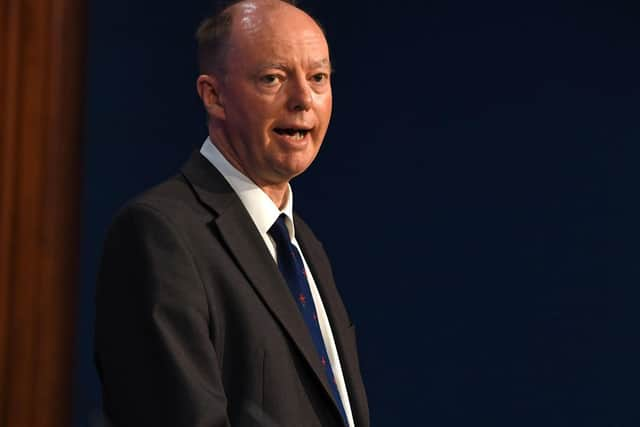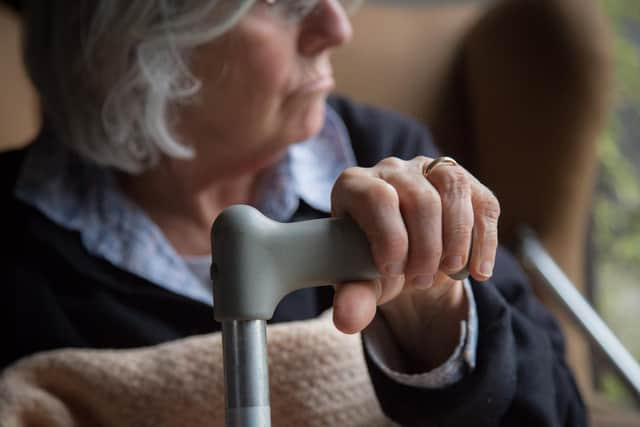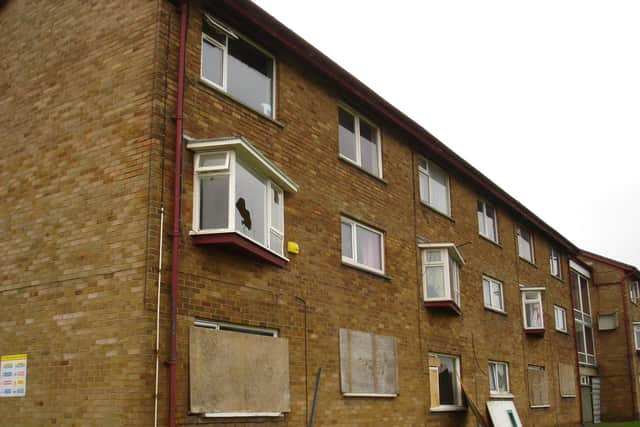Chris Whitty's report highlighting deprivation and health issues in coastal communities is welcomed in Blackpool
and live on Freeview channel 276
But now those longstanding problems have been highlighted in a major report from the high profile figure of England’s Chief Medical Officer, Professor Chris Whitty.
The man who has been on our TV screens almost daily throughout the coronavirus pandemic has called for a cross-government national strategy to improve the health and wellbeing of coastal communities.
Advertisement
Hide AdAdvertisement
Hide AdHe said despite significant efforts of local leaders, coastal communities such as Blackpool’s continue to have more and greater health challenges both physical and mental, with lower life expectancy and higher rates of many major diseases.


He wants to see a national co-ordinated strategy, greater coastal deployment of healthcare staff and improved data collection. His call has been welcomed locally.
His report points out that Blackpool is the most deprived local authority in England and also experiences the lowest life expectancy in England for both males and females (74.4 and 79.5 years respectively).
It says 23.4 per cent of adults here smoke, rising to 37 per cent in adults with routine or manual jobs.
Advertisement
Hide AdAdvertisement
Hide AdIndicators of poor diet, excess weight, alcohol use and physical activity are also significantly worse than the national average.


Blackpool has the highest rates of hospital admissions for alcohol‑related harm and drug‑related deaths in the country.
People working in Blackpool are far more likely to be working in temporary and insecure employment than in other areas. As with many other coastal communities, most jobs within Blackpool are related to tourism, directly or indirectly. They are often low‑skilled, low‑paid and affected by seasonality whilst residents can find it more difficult to take up opportunities that require a commute due in part to low levels of car ownership.
To compound those problems, the report said that coastal communities have difficulties in attracting NHS and social care staff.
Advertisement
Hide AdAdvertisement
Hide AdIt found coastal communities have 14.6 per cent fewer postgraduate medical trainees, 15 per cent fewer consultants and 7.4 per cent fewer nurses per patient than the national average despite higher healthcare needs.


And two other characteristics of coastal communities tend to increase the problems.
Historically, large numbers of former B&Bs has led to them being converted into Houses of Multiple Occupation which encourage the migration of vulnerable people from elsewhere in the UK and lead to concentrations of deprivation and ill health.
Finally, because many people dream of retiring to the sea-side, they have a higher population of older, retired citizens – who are likely to have more and increasing health problems.
Advertisement
Hide AdAdvertisement
Hide AdThey move to settle in coastal regions but without the same access to healthcare as urban inland areas.


In smaller seaside towns, 31 per cent of the resident population was aged 65 years or over in 2019, compared to just 22 per cent in smaller non-coastal towns.
He added that another important theme was that the underlying factors in coastal communities with poor health outcomes share more similarities with other coastal areas than their nearest inland neighbours.
For example, in terms of health characteristics, a resort town like Blackpool has more in common with Hastings, Skegness or Torbay than with Preston, just 18 miles inland.
Advertisement
Hide AdAdvertisement
Hide AdDr Ben Butler-Reid, a GP at Highfield Surgery in Blackpool and clinical director for NHS Blackpool and NHS Fylde and Wyre Clinical Commissioning Group, said: “The Fylde Coast is similar to other areas highlighted in the report and struggles to attract the same number of staff as inland areas.
“There are a number of strategies in place to improve the number of new starters, as well as retention schemes for existing staff, but this is against a background of national health and care staff shortages.
“Health and care partners continue to work collaboratively to improve staffing levels, in partnership with local colleges and universities.


“The burden of physical and mental health issues for people living on the Fylde Coast, as in other coastal areas, has been well recognised as this report makes clear.
Advertisement
Hide AdAdvertisement
Hide Ad“The North West has attracted increased funding specifically to deal with improvements in preventative health to reduce health inequities and this is a key priority for the local health system and primary care networks.”
Dr Sakthi Karunanithi, director of Public Health at Lancashire County Council said: “I really welcome this seminal report.
“It has provided us with a very useful perspective on boosting our efforts to influence the life chances and address the health inequalities faced by our coastal communities.”
Sharon Adams, Interim Operational Director of HR & OD said: “As one of the largest employers in the region, Blackpool Teaching Hospitals has more than 7,000 colleagues, many of who live and love working on the beautiful Fylde coast.
Advertisement
Hide AdAdvertisement
Hide Ad“The Trust like other NHS organisations has its recruitment challenges. But the Trust has seen a vastly improving vacancy position and has very few nursing vacancies due to it embarking heavily in our overseas nurses programme.
“We are also heavily investing in a ‘grow our own’ programme which will see us providing training and job opportunities for members of the local community.
“We want to retain our reputation as an Employer of Choice and hope by employing people from the local community that they in turn will be providing healthcare to local community. This is turn will also help improve the health and wellbeing of our staff who are also members of the local community.
“We are working with local schools, businesses and the DWP to provide training opportunities to young people and the long term unemployed with the ambition that these training opportunities turn into employment opportunities.”
Advertisement
Hide AdAdvertisement
Hide AdBlackpool Council’s Leader and Public Health Director have welcomed the Chief Medical Officer’s 2021 Annual report which highlights the substantially higher burden of physical and mental conditions in coastal areas and his recommendations to support those communities.
The report highlights that, despite the significant efforts of local leaders, coastal communities continue to have a high burden of health challenges across a range of physical and mental health conditions, often with lower life expectancy and higher rates of many major diseases.
In his report, Chief Medical Officer, Professor Chris Whitty has said: “These communities have often been overlooked by governments and the ill-health hidden because their outcomes are merged with wealthier inland areas. A national strategy informed by local leaders and experts will help reduce inequalities and preventable ill health.
“If we do not tackle the health problems of coastal communities vigorously and systematically there will be a long tail of preventable ill health which will get worse as current populations age.”
Advertisement
Hide AdAdvertisement
Hide AdDr Arif Rajpura, Blackpool Council Director of Public Health, said he welcomed the constructive approach that Professor Whitty had made in raising the profile of the issues facing coastal communities.
He added: “We will be carefully considering this report and its recommendations as we want people in Blackpool to be able to live healthier lives.
“Blackpool, like many other seaside towns has its strengths as the town is a major centre for tourism in England with 18 million visitors annually but it still is faced with economic and health challenges.
“We have been in close liaison with the Government and shared our experience to help deliver a better outcome for our town.
Advertisement
Hide AdAdvertisement
Hide Ad“There are a number of factors that contribute towards health inequalities, including deprivation, poor housing, and a low-wage economy.
“High levels of smoking, obesity and abuse of drugs and alcohol can also add to the problem.
“Such factors can translate into poor life expectancy for both men and woman, as well as high rates of cardiovascular, respiratory and liver disease. These can all result in an increased demand on health services.
“In Blackpool, we are working with alongside our colleagues in the NHS, as well as other partners, to deliver sustained changes to ensure that families, children and individuals can enjoy a good quality of life.”
Advertisement
Hide AdAdvertisement
Hide AdThe Council has already led on several initiatives to address some of the issues raised in Professor Whitty’s report.
These include: Key interventions in the housing market including selective licensing to tackle poor quality private housing stock and the establishment of My Blackpool Home which, to date, has created over 500 quality new homes out of failed B&Bs, HMOs and private rented accommodation.
Working with partner organisations to tackle health issues including obesity, smoking, mental health and delivering healthy lifestyle projects including the Fit2Go scheme run in conjunction with Blackpool FC Community Trust and targeting primary school children.
Coun Lynn Williams, Leader of Blackpool Council, said: “It is vital we get the support we need from the Government and a fairer share of national funding so that people have equal health and economic opportunities.
Advertisement
Hide AdAdvertisement
Hide Ad“A national strategy informed by local leaders and experts is welcome.
“Housing, especially poor quality private rented, is a significant contributor to poor health in the town.
“Tackling the failed private sector housing, especially the large number of houses of multiple occupation (HMOs) will be key to tackling health inequalities in coastal towns.
“Blackpool Council continues to exhaust all available means to intervene in the housing market in inner Blackpool.
Advertisement
Hide AdAdvertisement
Hide Ad“The council has long recognised that positive change will require a fundamental shift in the type and quality of properties that currently dominate the inner areas.
“As a council, we are also continuing to drive economic regeneration though a number of significant development plans which will create more jobs and result in a better Blackpool to work and live.”
Deborah Terras director with the Washington Group which works with young people in the resort said while the problems Blackpool had were well known it was important to look at the many positive things the area had to offer too.
She said: “I have been a youth worker here for 25 years and the same socio-economic narratives come up time and again.
Advertisement
Hide AdAdvertisement
Hide Ad“It is good to see this report however, and we do need to tackle the health aspects with the young people to improve the future.
“We have so many wonderful amenities here with the beaches and the sea air, but getting access to those amazing things, can sometimes be a problem.
“We do need to see more done to improve young people’s mental health and well being with improved services.
“We at the Washington Group are currently working on a five year strategy to improve young women’s health and for young men too.
Advertisement
Hide AdAdvertisement
Hide Ad“Young people do want to see change but it is also important to know that there are so many positives to Blackpool.”
Blackpool Gazette: Thanks for reading. If you value what we do and are able to support us, then a digital subscription is just £1 for your first month. Try us today by clicking here